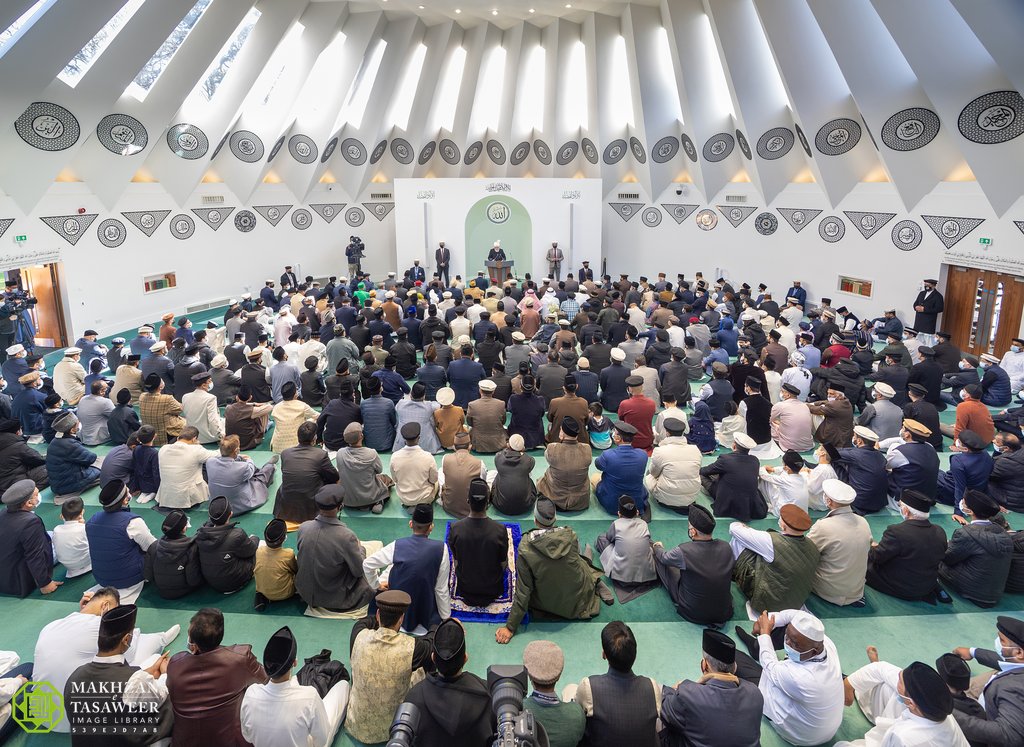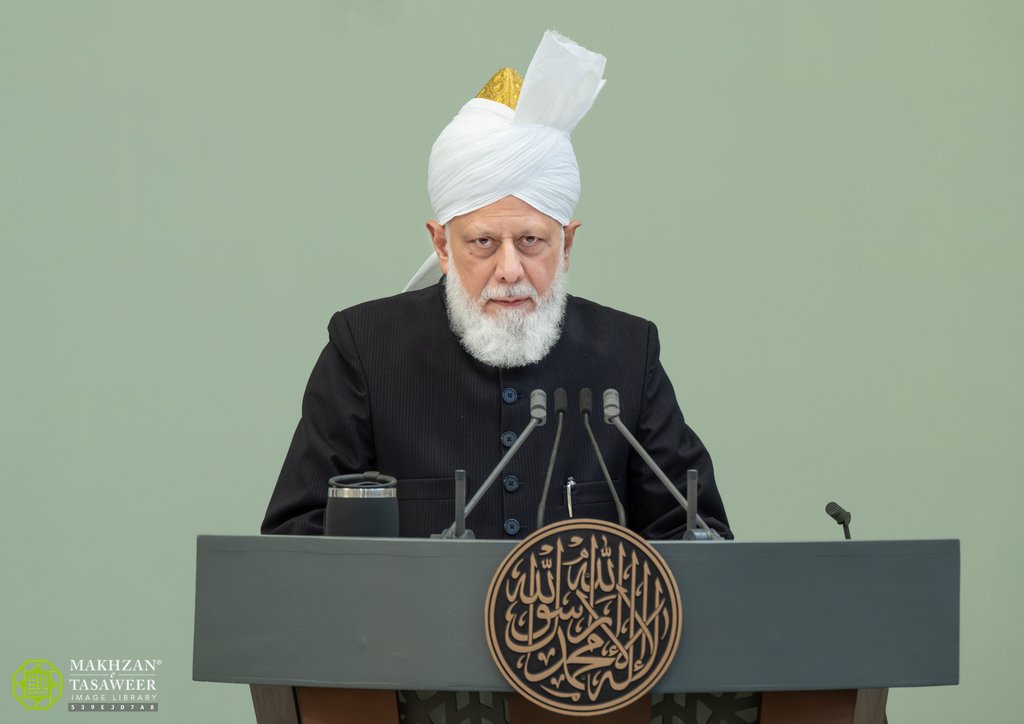
Head of Ahmadiyya Muslim Community Inaugurates Bait-ur-Raheem Mosque, Wales’ First Purpose-Built Ahmadiyya Mosque
“Our Mosques are not built to sow disorder or to incite division. Rather, they stand as shining beacons of peace, love, and harmony” – Hazrat Mirza Masroor Ahmad
On 23 November 2025, the World Head of the Ahmadiyya Muslim Community, the Fifth Khalifa (Caliph), His Holiness, Hazrat Mirza Masroor Ahmad delivered the keynote address at a special reception held to commemorate the opening of Bait-ur-Raheem Mosque (House of the Merciful God) in Cardiff, Wales – the first purpose-built Mosque of the Ahmadiyya Muslim Community in the country.
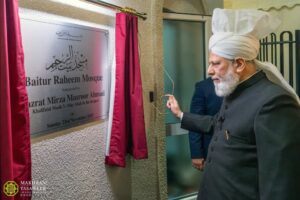
His Holiness, Hazrat Mirza Masroor Ahmad, unveils the plaque marking the inauguration of the Bait-ur-Raheem Mosque in Cardiff, Wales
The proceedings commenced with a recitation of the Holy Qur’an and its translation, followed by an introduction of the Mosque by Muhammad Noman, Regional Amir of South West and some guest remarks.
Thereafter, His Holiness graced the stage to deliver the keynote address.
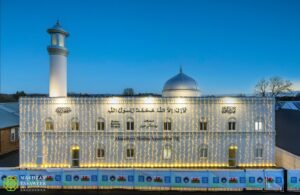
His Holiness opened the address by expressing deep appreciation to all attendees for accepting the invitation and joining the inauguration, noting that, “Your attendance at this purely religious and spiritual event demonstrates your open hearts and generosity of spirit.”
At the outset, His Holiness set out the objectives that underpin every mosque established by the Ahmadiyya Muslim Community.
Hazrat Mirza Masroor Ahmad stated:
“The purpose of this Mosque, like all true mosques, is to serve as a sacred place where people gather to worship Allah. Moreover, wherever we build a Mosque, it also stands as a testament to our commitment to our neighbours and the local community. Indeed, the abiding message that echoes aloud from all our Mosques is that, where they serve as a place to worship Allah, they also serve to foster peace, compassion and harmony throughout the world.”
Hazrat Mirza Masroor Ahmad continued:
“Thus, today, with the firm intention of fulfilling these noble objectives, the Ahmadiyya Muslim Community is overjoyed at being able to inaugurate our first Mosque in Wales. According to Islam’s teachings, when Ahmadi Muslims gather here to pray for themselves, they shall also pray for the peace, well-being and security of all people.”
During the keynote address, His Holiness noted that common misconceptions about Islam may lead to a feeling of uncertainty among local residents. His Holiness addressed such fears by stating that a mosque’s purpose is not to divide society but to promote peace and understanding.
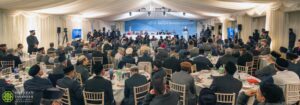
Hazrat Mirza Masroor Ahmad stated:
“At the outset, let me reassure you; our Mosques are not built to sow disorder or to incite division. Rather, they stand as shining beacons of peace, love, and harmony and reflect the deeply rooted peaceful values of our faith. Thus, during the time of the Holy Prophet Muhammad (peace and blessings of Allah be upon him), a group of malicious people built a Mosque with ill intent to create disorder and cause harm. Upon this, Allah instructed the Prophet of Islam (peace and blessings of Allah be upon him) to demolish that so-called Mosque.”
Hazrat Mirza Masroor Ahmad continued:
“The purpose of a Mosque is not fulfilled by its physical construction. Rather, a Mosque only serves its purpose when it is used for both the worship of God and also to manifest Islam’s true teachings of kindness, love, and compassion for all mankind, and to spread peace and security throughout society. Therefore, I reiterate that anyone who fears this Mosque could harm the peace and well-being of society should rest assured. Islam’s teachings are so inherently peaceful that those who strive to follow them can never even contemplate any act of evil or inciting division.”
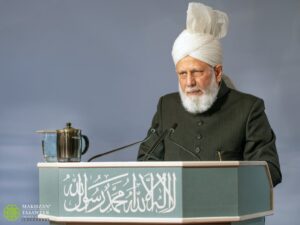
His Holiness emphasised that the Ahmadiyya Muslim Community has always been at the forefront of promoting peace, grounded firmly in its teachings and history. He noted that “our history demonstrates that we have consistently upheld the rights of all people, irrespective of their faith or beliefs. This is not because we have deviated from Islam. Rather, it is because we follow Islam,” adding that Islam makes clear that the worship of those who disregard the rights of others is ultimately “worthless and displeasing to God.”
Introducing the spiritual foundations of Islamic worship, His Holiness outlined the Qur’anic principles that bind prayer to service to humanity, noting that Chapter 107 of the Holy Qur’an makes clear that worship is rejected when divorced from compassion and moral duty.
Hazrat Mirza Masroor Ahmad stated:
“In chapter 107, verse 5, Allah says: ‘So, woe to those who pray.’ This verse warns that God rejects the prayers of certain people and the surrounding verses shed light on this. In the preceding verses, Allah condemns those who ignore the rights of society’s most vulnerable members, such as orphans or those mired in poverty. The subsequent verse states that the prayers of such people are insincere, deficient, and performed merely to impress others. Their prayers manifest only their hypocrisy and deception and so shall be rejected by God Almighty.”
His Holiness explained that the final verse highlights those who refuse to help those in need, noting that their selfishness also prevents others from assisting. He stressed that prayers and worship are only truly accepted when accompanied by sincere service to humanity, a fundamental teaching of Islam.
His Holiness further reflected on guidance provided in the Holy Qur’an, explaining that Allah has illuminated the paths of good and evil and granted humans the ability to discern right from wrong. He noted that while the choice lies with each individual, this divine guidance equips every person with an inner moral compass.
Hazrat Mirza Masroor Ahmad stated:
“Just as we have physical eyes to see the world, He has also bestowed us with an inner, spiritual eye – a moral compass – to guide us. However, if a person ignores their internal compass and follows selfish and worldly desires, they are bound to deviate from the right path and embrace evil and wrongdoing.”
Turning to contemporary issues, His Holiness reflected on the lessons of widespread slavery before Islam, citing chapter 90, verse 14 of the Holy Qur’an, which praises the freeing of enslaved people. He explained that while physical slavery has ended, economic exploitation continues to oppress vulnerable nations, setting the context for his remarks on global injustice.
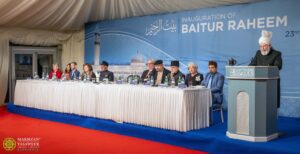
Hazrat Mirza Masroor Ahmad stated:
“Islam came to end all forms of slavery in the world. You might wonder if the example of slavery is still relevant today. Regrettably, it is. While physical slavery has ended, another form of slavery – economic servitude – continues to oppress people in many parts of the world. Less developed nations are trapped by crippling debt, leaving them powerless to prevent the plundering and exploitation of their natural resources by rich and powerful countries. Ultimately, these vulnerable nations are dictated to by wealthier nations. Islam condemns such exploitation as a form of enslavement that must be eradicated because such inequalities and injustices inevitably shatter the foundations of global peace – something we increasingly witness today.”
Hazrat Mirza Masroor Ahmad continued:
“The Qur’an specifically instructs Muslims to help ‘a poor man lying in the dust.’ These words are deeply significant, meaning Muslims are obligated to help those who are utterly crestfallen, who have no one else to aid them, and who have been forgotten by society. While some people have family or friends to support them, Muslims are instructed to identify and help those who have no one else. In economic terms, it means that if an individual has hit rock bottom and has no one to help him, a Muslim must endeavour to assist them and help them get back on their feet.”
Hazrat Mirza Masroor Ahmad stressed that if all nations, including Muslim countries, followed the unifying principles of the Holy Qur’an, it could “tear down the walls of crippling inequality, injustice and ignorance.” He noted that such action would foster compassion and understanding across societies, bringing true peace and security. His Holiness emphasised that these values are universally applicable and that anyone who acts upon them – Muslim or non-Muslim – contributes to a more harmonious world, a mission central to the Ahmadiyya Muslim Community’s work.
Building on the theme of mosques as centres of compassion and service, His Holiness emphasised the universal outreach of Islam, saying, “We invite all people, irrespective of their faith or beliefs, to join us in our effort to establish peace, tolerance and mutual understanding among all people in the world.” He further explained that Muslims are duty-bound to show kindness and uphold the rights of all people, from parents and relatives to neighbours, orphans, the needy, companions, travellers, and those under their care, as outlined in chapter 4, verse 37 of the Holy Qur’an.
Hazrat Mirza Masroor Ahmad stated:
“From cover to cover, the Holy Qur’an is filled with humane principles instructing Muslims to observe the highest morals, to be law-abiding and to seek to serve the communities in which they live with sincerity and love.”
Highlighting Muslims’ wider responsibilities, His Holiness noted that the Holy Qur’an calls for respect for leaders, obedience to the law, and service to humanity.
Hazrat Mirza Masroor Ahmad stated:
“The Holy Qur’an instructs Muslims to respect their leaders and governments and to uphold the laws of the land. Muslims are taught that loyalty and obedience to their country are intrinsic elements of their faith. Consequently, those who possess even a basic attachment to Islam understand that pleasing God and fulfilling a Mosque’s objectives are inseparable from adopting the highest moral values and serving humanity. As I said, the Holy Qur’an strongly emphasises the rights of one’s neighbours. Therefore, every Ahmadi who shall worship here is obliged to care for all of you and to manifest kindness and compassion.”
Hazrat Mirza Masroor Ahmad continued:
“Similarly, they must show sympathy and extend support to all those who have struggles, including orphans, the hungry or the infirm. Moreover, all those who enter this Mosque must be peaceful, law-abiding, and obedient to the authorities. I am sure you will agree that there is nothing to fear from people who uphold such values.”
Towards the conclusion of his keynote address, His Holiness highlighted how the Ahmadiyya Muslim Community puts its faith into action by serving humanity through practical humanitarian initiatives worldwide.
Hazrat Mirza Masroor Ahmad stated:
“Let me also clarify that the Ahmadiyya Muslim Community does not just make claims or speak in a way designed to impress others. Rather, we are determined to act on our teachings and to fulfil the demands of our faith. In short, we practice what we preach. For example, we have established hospitals and medical camps for the treatment of the poor and vulnerable in the developing world that serve people without distinction of religion or belief. Those who do not believe in God or reject our values or beliefs are treated with the same care, love, and sympathy as our own people are.”
Hazrat Mirza Masroor Ahmad continued:
“Similarly, we provide access to clean drinking water in remote parts of the world through the installation of water pumps and wells. Here in the Western world, people do not realise the true value of water and are unable to appreciate how difficult it is for some people in deprived countries to access it. Instead of going to school, many children frequently walk miles to fetch water for their families on a daily basis. This gravely impacts their futures and means that, without help, the cycle of poverty in which they were born is bound to continue. Accordingly, we identify areas of urgent need and send our engineers and experts to provide them with access to water in their homes or at their doorstep. These life-changing humanitarian projects are taking place in Africa, Asia, South America and other under-developed regions. We have also established orphanages providing shelter, love and care to some of the world’s most vulnerable children.”
His Holiness further emphasised the Ahmadiyya Muslim Community’s commitment to education and local support, highlighting how these efforts extend both globally and within the United Kingdom.
Hazrat Mirza Masroor Ahmad stated:
“In terms of education, we have established hundreds of schools across developing nations that provide primary and secondary education without any distinction. It matters not whether the students in our classrooms are Christians, Jews, Muslims, Atheists, or follow any other belief. Every child is of immeasurable worth and value. So, with the Grace of God, the Ahmadiyya Muslim Community is constantly engaged in serving humanity and this includes supporting local charities and community projects across the United Kingdom. Our sole aspiration and motivation is to alleviate suffering and to enable people to live their lives with dignity.”
Following this, His Holiness underscored that the Mosque would serve as a true beacon of light, projecting a message of peace and security for all people, irrespective of their faith, and symbolising that “serving Allah and serving humanity go hand in hand”.
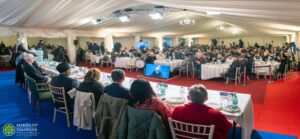
Before concluding his keynote address, His Holiness reminded Ahmadi Muslims in the area of their responsibility to live according to the inclusive and noble teachings of Islam. He emphasised that while it is their duty to worship Allah in the Mosque and pray for peace, they must also actively strive for it and be ready to make sacrifices for the greater good of mankind. His Holiness encouraged them to demonstrate through their actions that peace, love, respect, and unity are the only ways to build a society free from disorder and division.
Hazrat Mirza Masroor Ahmad stated:
“Now this Mosque is open, it is my heartfelt prayer those who enter it will not only fulfil the requirements of worshipping Allah but also always fulfil the needs of humanity. With these words, I wish to once again sincerely thank you all for joining us this evening. May Allah bless you all with peace and happiness. Ameen.
Earlier, during guest remarks, the High Sheriff of Glamorgan, Janet Davies, expressed her appreciation for the Ahmadiyya Muslim Community’s contributions to the local area.
A video message from the Secretary of State for Wales, Jo Stevens, congratulated the Community on the inauguration and commended their charitable work and guiding principle, “Love for All, Hatred for None.”
Jane Hutt MS, Cabinet Secretary for Social Justice, representing the First Minister of Wales, described the occasion as a “proud and historic moment” not only for the Ahmadiyya Muslim Community but for all the people of Wales.
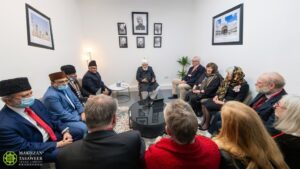
His Holiness meets several dignitaries who were invited during the historic inauguration of the Bait-ur-Raheem Mosque
Prior to the reception, His Holiness graciously met with several dignitaries, unveiled the inauguration plaque, and led attendees in a silent prayer. On the mosque grounds, His Holiness also planted a tree before leading members of the Ahmadiyya Muslim Community to the prayer hall to offer congregational prayers.
